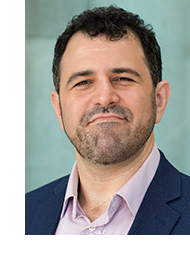SECOND EDITION OF UNDERSTANDING POWER PURCHASE AGREEMENTS, A LEADING OPEN-SOURCE GUIDEBOOK, EDITED BY PROFESSOR BADISSY, UNVEILED AT THE AFRICA ENERGY FORUM
 October 2020 — Five years after Assistant Professor of Law Mohamed Rali Badissy first brought together a group of world-class experts to collaboratively write Understanding Power Purchase Agreements, a second group gathered in July 2019 to update and refresh the handbook. The second edition, again contributed to and principally edited by Professor Badissy, was released at the virtual Africa Energy Forum, the largest gathering of government leaders and private investors in Africa’s power market.
October 2020 — Five years after Assistant Professor of Law Mohamed Rali Badissy first brought together a group of world-class experts to collaboratively write Understanding Power Purchase Agreements, a second group gathered in July 2019 to update and refresh the handbook. The second edition, again contributed to and principally edited by Professor Badissy, was released at the virtual Africa Energy Forum, the largest gathering of government leaders and private investors in Africa’s power market.
Prior to joining Dickinson Law in 2019, Professor Badissy served as the Senior Attorney for Energy and Finance with the Commercial Law Development Program of the U.S. Department of Commerce, advising governments in emerging markets on commercial law reforms intended to catalyze private investment in energy infrastructure. During his consultations with dozens of governments around the world, Professor Badissy observed a disparity in understanding the best practices around successful power project development, particularly in markets that had not hosted this type of large private infrastructure investment.
Realizing that the dissemination of best practices around power projects contracts, financing and procurement could only succeed if there was trust in the neutrality and credibility of the source, Professor Badissy championed developing an open-source knowledge library through a joint authorship process that integrated a wide range of expertise and backgrounds. Following two years of outreach and consensus-building, Professor Badissy brought together a diverse group of contributors in November 2014 from African governments, multilateral institutions, development banks, private developers, and leading international law firms to write what became Understanding Power Purchase Agreements. The handbook is a practical guide for governments and other decision-makers, and explains the legal structuring and risk allocation in power project contracts in plain language and presents officials with strategies on how to manage these legal and financial obligations.
Understanding Power Purchase Agreements became the first in a series of four Understanding handbooks that currently have more than 65,000 copies in print and tens of thousands more copies downloaded. The Understanding series has been translated into French and Amharic and has been used by USAID, the World Bank, the African Development Bank, and the African Union for capacity building. Most importantly, the handbooks have been hailed by government ministries, regulators and industry representatives for their accessibility and and widely adopted by governments throughout Africa.
For the second edition of Understanding Power Purchase Agreements, Professor Badissy reunited many of the original authors and invited new voices to update the original handbook based on the rapid evolution of Africa’s power sector. The updates handbooks also includes case studies on the negotiation of power purchase agreements for both small and large-scale projects, along with new guidance on emerging issues in the African power markets such as commercial and industrial power purchase agreements and cross-border agreements.
Understanding Power Purchase Agreements — Second Edition was unveiled and discussed by Professor Badissy and several of his co-authors over three virtual sessions during the Africa Energy Forum (the global investment meeting for Africa's power, energy, infrastructure and industrial sectors attended by more than 4,000 participants) held October 26-28, 2020.
Professor Badissy currently serves as an Assistant Professor at Penn State Dickinson Law, where his research focuses on driving investment into sustainable energy projects through contract standardization and regulatory predictability. He previously served as the Senior Attorney for Energy and Finance with the Commercial Law Development Program of the U.S. Department of Commerce, advising governments in emerging markets on commercial law reforms intended to increase energy access through private investment in energy infrastructure. Badissy has advised energy sector reform efforts in 60+ emerging markets in partnership with host governments, multilateral institutions, civil society organizations and industry leaders, and continues to serve as an advisor to both public institutions and private developers.